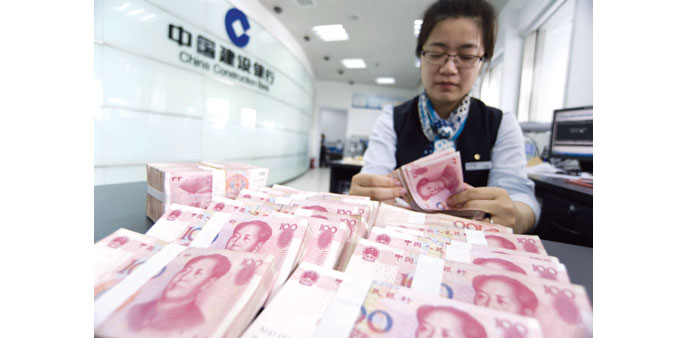The yuan’s inclusion in the International Monetary Fund’s basket of reserve currencies will contribute to stability in the international monetary system and is a welcome development, Bank Negara Malaysia governor Zeti Akhtar Aziz said in Kuala Lumpur on Friday.
Bloomberg
Beijing
Policymakers in Asia welcomed the Chinese yuan’s inclusion in the International Monetary Fund’s basket of reserve currencies, with South Korea expecting to boost holdings of the currency and Hong Kong pledging to increase support for yuan trading.
The decision is a “key milestone” in the yuan’s internationalisation and confirms its status as a freely usable currency, Hong Kong Monetary Authority chief executive Norman Chan said in a statement. The yuan’s weighting in the Bank of Korea’s foreign-exchange reserves is expected to increase and South Korea plans to issue yuan-denominated sovereign bonds this month, BoK official Park Jun Seo said at a forum.
The IMF’s executive board voted to add the yuan to the Special Drawing Rights basket, which includes the dollar, euro, pound and yen, in the first change in the SDR’s currency composition since 1999. The move is a key step in a decades-long ascent towards international credibility for the currency, which was created after World War II and for years could be used only domestically in the Communist-controlled nation. “Being the largest offshore RMB business centre with close economic and trade ties with Mainland China, Hong Kong should seize this historic opportunity and continue to strengthen our financial market infrastructure, as well as upgrading our talent pool and products,” said HKMA’s Chan, referring to the renminbi.
“Hong Kong can continue to play a pivotal role of bridgehead and financial hub in the process of mainland’s further opening up its financial markets and RMB internationalisation.” Renminbi is the currency’s official name and means “the people’s currency” in Mandarin; yuan is the unit.
The addition will take effect October 1, 2016, with the yuan having a 10.92% weighting in the basket, the IMF said.
Weightings will be 41.73% for the dollar, 30.93% for the euro, 8.33% for the yen and 8.09% for the British pound. The dollar currently accounts for 41.9% of the basket, while the euro accounts for 37.4%, the pound 11.3% and the yen 9.4%.
Japan, Asia’s top economy until it was unseated by China, said it respected the IMF’s decision. It refrained from any commitment to buy yuan for its own reserves, which are the world’s second largest, after China’s. While Finance Minister Taro Aso welcomed the yuan’s inclusion in the SDR, he told reporters in Tokyo that the move wouldn’t have an influence on private transactions in the Chinese currency. “The yuan’s inclusion as an SDR reserve currency has symbolic significance, but it’s not as if this will have a direct impact on the global economy or capital transactions,” Aso said.
The decision establishes the yuan as a fixture in the very international monetary system Chinese leaders criticised following the global financial crisis. In a landmark 2009 speech, People’s Bank of China governor Zhou Xiaochuan argued a global system so reliant on a single currency – the US dollar – was inherently prone to shocks. That conviction set off a global push by China’s leaders, including now-President Xi Jinping, to have the yuan included in the SDR, which countries can use to supplement their currency reserves.
The yuan’s inclusion will contribute to stability in the international monetary system and is a welcome development, Bank Negara Malaysia Governor Zeti Akhtar Aziz said in Kuala Lumpur.
She said Malaysia’s central bank is comfortable with its current holdings of renminbi and expects some Southeast Asian countries with significant trade with China to increasingly use the yuan for bilateral trade to reduce
volatility.
The Monetary Authority of Singapore said before the IMF’s decision it supported the yuan’s inclusion in the SDR.
As China’s share of the global economy grows and its financial markets develop, we can expect global reserve managers to invest more in China, an MAS spokesperson said in November.
Singapore supports the currency’s inclusion in the SDR, which should be a positive development for global reserve managers, the spokesperson said.
Indonesia is open to the possibility of increasing its yuan reserves, which would require a long and gradual process, said Bank Indonesia official Nanang Hendarsah. Bangko Sentral ng Pilipinas governor Amando Tetangco told reporters that the Philippines continues to consider investing in the yuan as part of its effort to diversify foreign currency reserves.
India is including yuan assets to diversify its holdings, central bank governor Raghuram Rajan told the South China Morning Post on Novemmber 22.
The IMF endorsement is a bright spot in what has been a tumultuous year for the world’s second-biggest economy, which has been buffeted by slowing growth, a tumbling stock market and a shift by authorities toward a more market-oriented exchange rate. SDR inclusion is a “win-win” for both China and the world and acknowledges China’s achievements in economic development and reform, the PBoC said in a
statement.

